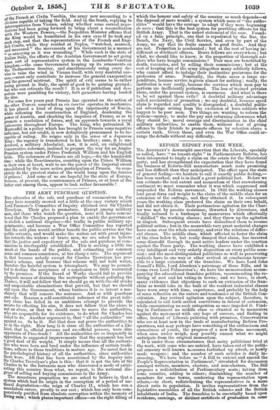THE ARMY PURCHASE QUESTION.
TICE advocates of the sale and purchase of commissions in the Army have recently crowed not a little at the easy victory which Lord Panmure's Committee of Inquiry obtained over Sir Charles Trevelyan. Their glee is premature. Except among military, men, and those who watch the question, none will have remem- bered that Sir Charles proposed a plan to enable the government to abolish a national disgrace—the traffic in public military ap- pointments; and because a War Office Committee has reported that the said plan would neither benefit the public service nor the public servants, and would make the nation act with great injus- tice towards the widows of brave men, we are asked to believe that the justice and expediency of the sale and purchase of com- missions is irrefragably established. This is seeking a little too much at the hands of the public, and estimating our common sense and common conscience, at too cheap a rate. The argument is, that because nobody except Sir Charles Trevelyan has pro- posed a scheme and because that scheme will not hold water, therefore the hateful system is triumphant. We may be permit- ted to decline the acceptance of a conclusion so little warranted by the premises. If the Board of Works should fail to provide adequate means of draining the metropolis without polluting the Thames, it will not follow that we should go on with the old stinks and unspeakable abominations that prevail, but that we should call upon the Government, whose business it is to invent a ma- chinery that will remove the nuisance. And so with purchase and sale. Because a self-constituted reformer of the great mili- tary abuse has failed in an ambitious attempt to provide the means for effecting his aim it does not follow that the abuse is not an abuse, or that we should cease to move the authorities, who are responsible for its existence, to do what Sir Charles has failed to do. Another argument is, that "all the authorities" are against us. So be it. But that does not prove the authorities to be in the right. How long is it since all the authorities of a like kind, that is, official persons and ex-official persons, were dire opponents of Free-trade? All the authorities are so frequently in opposition to suggested improvements that the argument has lost a good deal of its weight. It simply means that all the authori- ties who were born and bred under the influence of certain tradi- tions, adhere to those traditions in mature age. No novel fact in the psychological history of all the authorities, since authorities there were. All that has been ascertained by the inquiry into Sir Charles Trevelyan's plan is this : that it is not the fate of Sir Charles to be the fortunate man who discovered a mode of extri- cating this countay• from what, we repeat, is the national &a- gree° of selling and buying commissions in the Army. The monstrous proposition we are asked to believe is, that a system which had its origin in the corruption of a period of na- tional degradation—the reign of Charles II., which has run a scandalous career, greatly to our cost ; which has only been com- taratively purified from absolute corruption within the memory of .ving liken; which places important offices—on the right filling of
which the honour and safety of the country so much depends—at the disposal of mere wealth ; a system which none of "the autho- rities" would have the courage to adopt if they were beginning de novo that this is the best system for providing officers for the British Army. That is the naked statement of the case. Found- ed on a false principle, one that is repudiated by the Bar, the Bench, the Navy, the Civil Service, and even by part of the Army, we say that its fruits cannot be good fruits. And they are not. Promotion is accelerated ; but at the cost of having in- different or dilettanti officers. Brave fellows are everywhere ; but what, we should like to know, is the proportion of thorough sol- diers who have bought commissions ? Poor men are benefitted by death, vacancies, and by selling their commissions ; but at the cost of keeping tut of the army altogether many soldierly fellows, who cannot afford to indulge their instinctive preference for the profession of arms. Nominally, the State saves a large ex- penditure, because service is given almost for nothing'; really, the institution is very costly, because the services which men pay to perform are inefficiently performed. The loss of trained privates alone, under the present system, is enormous. And what is there to be set against these evils ? A doubtful military advantage called acceleration of promotion ; we say doubtful, because speed alone is regarded and quality is disregarded; a doubtful politi- cal advantage arising from the exclusion of born soldiers who happen to be poor men. Two things are wanting to reform the system—money, to make the pay and returning allowances what they should be ; moral courage and discrimination in the chief military authorities, to enable them, without fear of giving offence to their friends to promote officers by selection above a certain rank. Given these, and even the War Office could ar- range the details without any difficulty.


































 Previous page
Previous page